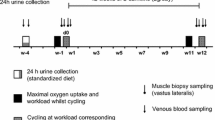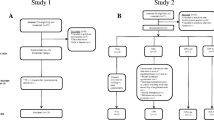Summary
Two trials were conducted to investigate the effects of l-carnitine supplementation upon maximum and submaximum exercise capacity. Two groups of healthy, untrained subjects were studied in double-blind cross-over trials. Oral supplementation of 2 g per day l-carnitine was used for 2 weeks in the first trial and the same dose but for 4 weeks in the second trial. Maximum and submaximum exercise capacity were assessed during a continuous progressive cycle ergometer exercise test performed at 70 rpm. In trial 1, plasma concentrations of lactate and β-hydroxybutyrate were measured pre- and post-exercise. In trial 2, pre- and post-exercise plasma lactate were measured. The results of treatment with l-carnitine demonstrated no significant changes in maximum oxygen uptake (\(\dot V_{O_{2\max } }\)) or in maximum heart rate. In trial 1, there was a small improvement in submaximal performance as evidenced by a decrease in the heart-rate response to a work-load requiring 50% of \(\dot V_{O_{2\max } }\). The more extensive trial 2 did not reproduce the significant result obtained in trial 1, that is, there was no significant decrease in heart rate at any given submaximal exercise intensity, under carnitine-supplemented conditions. Plasma metabolic concentrations were unchanged following l-carnitine, in both trials. It is concluded, that in contrast to other reports, carnitine supplementation may be of little benefit to exercise performance since the observed effects were small and inconsistent.
Similar content being viewed by others
References
Bookelman H (1978) Pyruvate oxidation in rat and human skeletal muscle. Biochem Med 20:395–403
Cooper MB, Jones DA, Edwards RHT, Corbucci GC, Montanari G, Trevisani C (1986) The effect of marathon running on carnitine metabolism and on some aspects of muscle mitochondrial activities and antioxidant mechanisms. J Sport Sci 4:79–258
Davies CTM, Tuxworth W, Young JM (1970) Physiological effects of repeated exercises. Clin Sci 39:247–258
Di Donato S, Cornelio F, Storchi G, Rimoldi M (1979) Hepatic ketogenisis and muscle carnitine defficiency. Neurology 29:780–786
Eclache JP, Quard S, Carrier H, Berthiller G, Marnot B, Eischenberger D (1979) Effets d'une adjonction de carnitine au régime alimentaire sur l'exercise intense et prolongé. Place de l'alimentation dans la préparation biologique à la compétition. Comptes Rendus du colloque de St-Etienne
Fritz IB (1963) Carnitine and its role in fatty acid metabolism. Adv Lipid Res 1:285–334
Fritz IB, Yue KTN (1963) Long-chain carnitine acyltransferase and the role of acyl carnitine derivatives in the catalytic increase of fatty acid oxidation induced by carnitine. J Lipid Res 4:279–287
Froberg SO, Ostman J, Sjostrand N (1972) Effect of training on esterified fatty acids and carnitine in muscle and on lipolysis in adipose tissue in vitro. Acta Physiol Scand 86:166–174
Havel RJ, Carlson LA, Ekelund LG, Homoreu A (1964) Turnover rate and oxidation of different free fatty acids in males during exercise. J Appl Physiol 19:613–618
Issekutz B, Miller HI, Rodahl K (1966) Lipid and Carbohydrate metabolism during exercise. Fed Proc 25:1415–1420
Lennon DFL, Strathan FW, Shrago E, Nagee FJ, Madden M, Hanson P, Carter AL (1983) Effects of acute moderate intensity exercise on carnitine metabolism in males and females. J Appl Physiol 55:789–795
Lloyd B, Burin J, Smythe P, Alberti KGMM (1978) Simple automated enzymic fluorometric assays for blood glucose, lactate, pyruvate, alanine, glycerol and 3-hydroxybutyrate. Clin Chem 24:1724–1729
Marconi C, Sassi G, Cardinelli A, Ceretelli P (1985) Effects of l-carnitine loading on the aerobic and anaerobic performance of endurance athletes. Eur J Appl Physiol 54:131–135
Mole PA, Oscai LB, Holloszy JO (1971) Adaptation of muscle to exercise. Increase in levels of palmityl CoA synthetase, carnitine palmityl transferase, palmityl CoA dehydrogenase and their capacity to oxidise fatty acids. J Clin Invest 50:2323–2330
Sargeant AJ, Crawley MA, Davies CTM (1979) Physiologic responses to exercise in myocardial infarction patients following residential rehabilitation. Arch Physiol Med Rehab 60:121–125
Trovato GM, Ginardi V, Di Marco V, Dell'aira AE, Corsi M (1982) Long-term l-carnitine treatment of chronic anaemia of patients with end-stage renal failure. Curr Ther Res 31:1042–1048
Van Hinsbergh VMW, Veerkamp JH, Glatz JFC (1979) 4-methyl-2-oxopentanoate oxidation by rat skeletal muscle mitochondria. Biochem J 182:353–360
Author information
Authors and Affiliations
Rights and permissions
About this article
Cite this article
Greig, C., Finch, K.M., Jones, D.A. et al. The effect of oral supplementation with l-carnitine on maximum and submaximum exercise capacity. Europ. J. Appl. Physiol. 56, 457–460 (1987). https://doi.org/10.1007/BF00417775
Accepted:
Issue Date:
DOI: https://doi.org/10.1007/BF00417775




